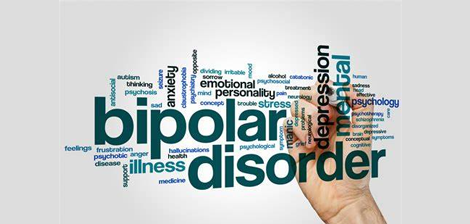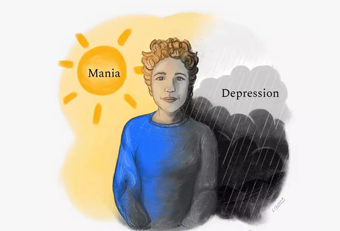
Bipolar disorder is a mental health condition that is characterized by episodes of mania or hypomania, and depression. It is a chronic condition that can affect a person's mood, energy level, and ability to function. Bipolar disorder is often referred to as manic-depressive illness because it involves episodes of both mania and depression.
There are several types of bipolar disorder, including bipolar I, bipolar II, and cyclothymic disorder. In bipolar I disorder, a person experiences at least one episode of mania, which is a period of elevated, expansive, or irritable mood that lasts for at least a week. A person with bipolar II disorder experiences at least one episode of hypomania, which is a less severe form of mania, and at least one episode of major depression. In cyclothymic disorder, a person experiences numerous periods of hypomania and depression that do not meet the criteria for a full manic or depressive episode.
The exact cause of bipolar disorder is not fully understood, but it is believed to be a combination of genetic, environmental, and neurobiological factors. Family history of the condition is a strong risk factor for developing bipolar disorder. Stressful life events, substance abuse, and changes in sleep patterns can also trigger episodes of mania or depression in people with bipolar disorder. Brain imaging studies have shown that people with bipolar disorder have differences in the structure and function of certain areas of the brain that regulate mood and behavior.
The symptoms of bipolar disorder can vary depending on the type of episode a person is experiencing. During a manic episode, a person may experience elevated or irritable mood, increased energy, decreased need for sleep, racing thoughts, grandiosity, excessive involvement in pleasurable activities, and impulsive behavior. During a depressive episode, a person may experience sad or hopeless mood, loss of interest in activities, changes in appetite and sleep patterns, fatigue, difficulty concentrating, and suicidal thoughts or behaviors.
Bipolar disorder can significantly impact a person's daily functioning, relationships, and quality of life. People with bipolar disorder may have difficulty maintaining stable relationships, employment, or academic performance. They may also engage in risky behaviors, such as substance abuse, impulsivity, or overspending, during manic episodes.
Treatment for bipolar disorder typically involves a combination of medication and psychotherapy. Mood stabilizers, such as lithium, valproic acid, or carbamazepine, are often prescribed to help reduce the frequency and severity of manic or depressive episodes. Antipsychotic medications may also be prescribed to help manage symptoms during a manic episode.
Psychotherapy, specifically cognitive-behavioral therapy (CBT), can also be helpful in managing the symptoms of bipolar disorder. CBT is a type of therapy that focuses on identifying and changing negative or distorted thoughts and behaviors. In the case of bipolar disorder, CBT can help people develop coping strategies to manage their symptoms, and to recognize early warning signs of an impending episode.
In addition to medication and psychotherapy, other self-help strategies can be helpful in managing the symptoms of bipolar disorder. These strategies include:
1) Regular sleep patterns:- Maintaining a regular sleep schedule can help regulate mood and reduce the risk of triggering a manic or depressive episode.
2) Stress management:- Stress can exacerbate the symptoms of bipolar disorder. Practicing stress-management techniques, such as deep breathing, progressive muscle relaxation, and guided imagery, can help reduce stress levels.
3) Exercise:- Regular exercise can help improve mood, reduce stress, and improve overall well-being.
4) Substance use:- Alcohol and drug use can worsen the symptoms of bipolar disorder. Avoiding substance use, or seeking treatment for substance abuse, can help manage symptoms of the disorder.


Get Free Appointment
We are more than happy to give advice on which counselling is most suitable for your needs, depending on your problems. Why not ask us to view your problems and discuss for solution.
